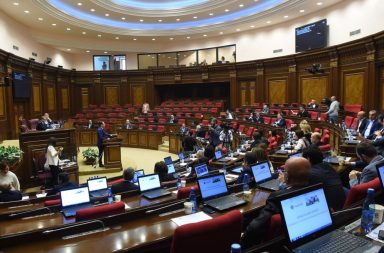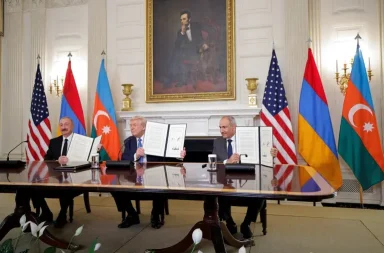by David Bishop
At the beginning of this month, Armenia achieved a notable symbolic victory in international affairs, as the only United Nations member state that refused to recognize its sovereignty – Pakistan – finally did so in a joint diplomatic statement. Thus, Armenia can at least be removed from the category of “partially recognized” UN member states, as it is now recognized by all members of the organization.
Pakistan had long refused to establish formal diplomatic relations with Armenia due to its position of supporting fellow Muslim states, in this case Turkey and especially Azerbaijan. Unlike other states, however, which simply did not recognize the Armenian presence in Artsakh (considering that territory part of Azerbaijan), Pakistan uniquely went as far as to not even recognize the sovereignty of the Republic of Armenia at all, though even Azerbaijan did. Some analysts have interpreted this as simply Pakistan wanting to “go above and beyond” in signaling their commitment to Muslim solidarity. After all, Pakistan and Armenia had essentially no interaction anyway, so Pakistan did not lose very much from holding such an unreasonable position.
During the 2023 war and ethnic cleansing of Artsakh, Pakistan proclaimed unwavering support for Azerbaijan, and even used the propaganda term “anti-terrorist operation” in its media to describe the Azeri conquest of a territory with a nearly 100% ethnically Armenian population. However, after Artsakh became essentially 100% empty of Armenians, and with Pashinyan’s government having no intention of taking any action to change the situation, Pakistan was finally prepared to extend recognition.
The two countries’ foreign ministries had occasion to interact with each other during the annual summit of the Shanghai Cooperation Organization (SCO) in late August. The SCO is an economic and security-focused partnership of states across the Eurasian landmass, initially led by China and Russia but now including such regional powers as India, Pakistan, and Iran. Armenia has consistently sought to join this organization and was granted the status of “dialogue partner” during the Serzh Sargsyan administration in 2016. Nonetheless, Pakistan expressed its hostility to Armenia yet again at the SCO summit this year, vetoing a proposal for full Armenian membership. Despite this hostility, however, Pakistani and Armenian officials met at the summit in Tianjin, China on August 31.
This meeting would become the first ever diplomatic meeting between Pakistan and Armenia on the level of foreign ministers. The Armenian Minister of Foreign Affairs Ararat Mirzoyan and his Pakistani counterpart Mohammed Ishaq Dar ceremonially met and signed a document entitled “Joint Communique on the Establishment of Diplomatic Relations between Armenia and Pakistan”. According to the Armenian Foreign Ministry, this communique signals the desire of the two governments “to enhance friendly relations in accordance with the UN charter”. Moreover, it is stipulated that Armenia and Pakistan will now exchange diplomatic representatives for the first time.
Since the signing of the agreement on diplomatic relations between Armenia and Pakistan, some speculation has emerged regarding Pakistan’s broader geopolitical intentions. Indeed, on September 9, the Russian media organization TASS reported, citing diplomatic sources, that Pakistan formally recognized Armenia as part of a broader deal to allow Pakistan membership in the Eurasian Economic Union (EAEU), of which Armenia and Russia are member states. This statement was supported by Pakistani Minister of Trade Nasir Hamid, who described “recently established diplomatic ties with Armenia” making Pakistan “ready to move closer to the EAEU”. However, the Armenian Ministry of Foreign Affairs strongly denied this information. Time will tell how Armenian and Pakistani international cooperation may unfold after the recognition and establishment of relations between the two countries.


